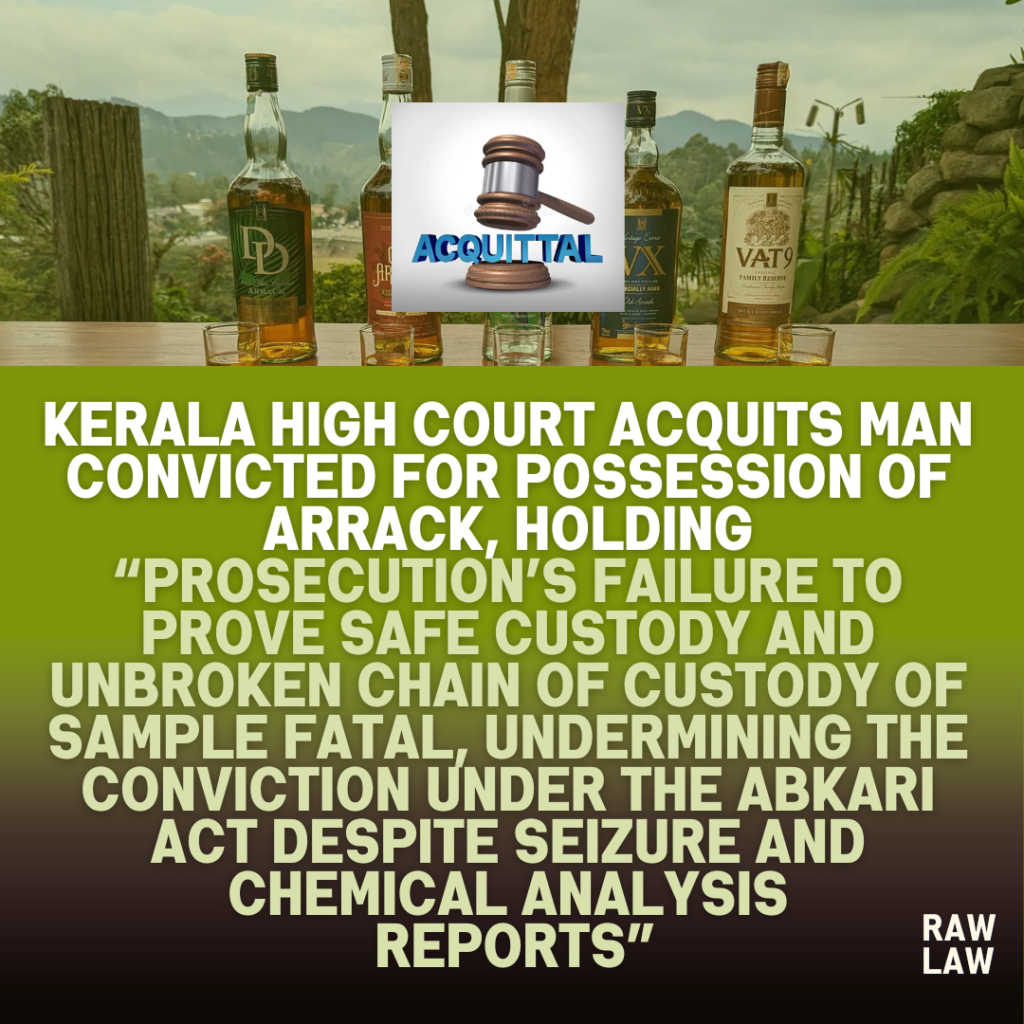Court’s Decision
The Kerala High Court allowed the criminal appeal, set aside the conviction and sentence under Section 8(2) read with 8(1) of the Abkari Act, and acquitted the appellant. The Court directed the refund of any fine deposited, holding that the prosecution’s failure to prove the safe custody and unbroken chain of custody of the sample until it reached the chemical examiner was fatal to sustaining the conviction.
Facts
The appellant was convicted by the Additional Sessions Court for allegedly possessing 2 litres of arrack in contravention of the Abkari Act near a tea factory muster shed in Upputhara Village on 22 July 2012. The detecting officer seized the contraband, drew a sample, and prepared a seizure mahazar. The case proceeded through the Magistrate Court and was committed to the Sessions Court, which convicted the appellant, sentencing him to one year of simple imprisonment with a fine of ₹1,00,000, and in default, two months of imprisonment. The appellant challenged this conviction, arguing procedural lapses and lack of evidence.
Issues
- Whether the prosecution proved the safe custody and unbroken chain of custody of the seized sample until it reached the chemical examiner.
- Whether the prosecution could sustain the conviction based on the evidence of the detecting officer alone despite hostile independent witnesses.
- Whether the procedures for seizure, sampling, and forwarding of the sample were strictly followed in compliance with legal standards under the Abkari Act.
Petitioner’s Arguments
The appellant argued that the conviction was based on conjectures, and the procedures relating to seizure and sampling lacked tamper-proof mechanisms. It was contended that the independent witnesses turned hostile, and relying solely on the detecting officer’s testimony was unsafe. The appellant further argued that the prosecution failed to establish the essential link evidence proving that the sample seized at the detection spot was the same that reached the chemical examiner’s laboratory, warranting acquittal.
Respondent’s Arguments
The prosecution argued that all procedural formalities were duly followed, the sample was drawn at the spot, produced before the court on the same day, and the seal used was recorded on the seizure mahazar, property list, and forwarding note, ensuring no tampering. It was submitted that the chemical examiner confirmed the seals were intact, affirming the authenticity of the sample and supporting the conviction.
Analysis of the Law
The Court reiterated that in cases under the Abkari Act, proving the safe custody and unbroken chain of custody of seized samples until chemical analysis is mandatory. Reference was made to Kumaran P. v. State of Kerala (2016 (5) KHC 632), holding that failure to examine the Thondi clerk or the excise guard responsible for transporting the sample to the laboratory creates a gap in the prosecution’s case.
Precedent Analysis
The judgment relied on:
- Kumaran P. v. State of Kerala (2016 (5) KHC 632): Emphasized the prosecution’s duty to prove the safe custody and unbroken chain of custody of samples in Abkari cases, with failure creating a fatal gap in evidence.
This precedent directly influenced the Court’s reasoning, reinforcing that procedural lapses undermine the conviction under the Abkari Act.
Court’s Reasoning
The Court found that although the seizure and sampling procedures were formally documented and seals were intact, the forwarding note did not mention the name of the excise guard entrusted with delivering the sample to the chemical examiner, and neither the Thondi clerk nor the guard was examined. This failure created a break in the chain of custody, undermining the prosecution’s case. The hostility of the independent witnesses was noted but deemed secondary since the core issue was the prosecution’s failure to prove the secure and uninterrupted custody of the sample.
Conclusion
The appeal was allowed. The conviction and sentence imposed on the appellant were set aside, and he was acquitted of the charges under Section 8(2) read with 8(1) of the Abkari Act. The Court ordered the refund of the fine deposited by the appellant in accordance with the law.
Implications
This judgment reinforces:
- The strict procedural safeguards in Abkari cases, particularly regarding safe custody and the chain of custody of seized samples.
- That hostile witnesses do not automatically undermine prosecution if official evidence is strong, but lapses in custody procedures are fatal.
- It protects individuals from wrongful convictions in cases under the Abkari Act due to procedural non-compliance.
Short notes on cases referred and applied
- Kumaran P. v. State of Kerala (2016 (5) KHC 632): Held that failure to prove safe and uninterrupted custody of seized samples is fatal in Abkari cases, requiring acquittal if the chain of custody is broken.
This principle directly guided the High Court in acquitting the appellant in this case.
FAQs
1. What is the importance of chain of custody in Abkari Act cases?
The chain of custody ensures the seized sample remains untampered from seizure to analysis. Any break undermines the prosecution’s case, leading to acquittal.
2. Can a conviction under the Abkari Act be set aside if witnesses turn hostile?
Hostile witnesses alone may not suffice for acquittal if official evidence is strong, but procedural lapses in custody and handling of samples can lead to acquittal.
3. What procedural lapse led to acquittal in this case?
Failure to record and prove who transported the seized sample to the chemical examiner and not examining relevant officials broke the chain of custody, leading to acquittal.



